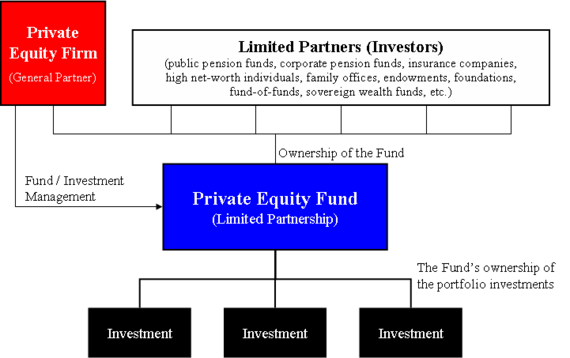Private equity firm facts for kids
A private equity firm or private equity company is an investment management company that provides financial backing and makes investments in the private equity of startup or an existing operating company to make a profit on its investments. This is done by the private equity firm raising funds to invest in private companies that have not been publicly listed.
Private equity firms have been described as a financial sponsor. A private equity firm will raise funds, pools of capital, or private-equity funds that supply the equity. These funds will be invested in accordance with one or more specific investment strategies including leveraged buyout, venture capital, and growth capital. There has been criticism of private equity firms by some that say they have pocketed huge and controversial profits while stalking ever larger acquisition targets.
History
The history of private equity firms has occurred through a series of boom-and-bust cycles since the middle of the 20th century with significant growth since the 1980s. Within the broader private equity industry, two distinct sub-industries, leveraged buyouts and venture capital experienced growth along parallel, although interrelated tracks.
In its early years through to roughly the year 2000, the private equity and venture capital asset firms were primarily active in the United States. With the second private equity boom in the mid-1990s and liberalization of regulation for institutional investors in Europe, a mature European private equity market emerged.
Business model
Private equity firms, with their investors, will acquire a controlling or substantial minority position in a company and then look to maximize the value of that investment. Strategies include leveraged buyout (with borrowed capital), venture capital (for start ups), and growth capital (mature companies).
Private equity firms generally receive a return on investment through one of the following avenues:
- an initial public offering (IPO) — shares of the company are offered to the public, typically providing a partial immediate realization to the financial sponsor as well as a public market into which it can later sell additional shares;
- a periodic management fee as well as a share in the profits earned (carried interest) from a private-equity fund managed.
- a recapitalization — cash is distributed to the shareholders (in this case the financial sponsor) and its private-equity funds either from cash flow generated by the company or through raising debt or other securities to fund the distribution.
- a merger or acquisition — the company is sold for either cash or shares in another company;
Difference to hedge fund firms
Private equity firms characteristically make longer-hold investments in target industry sectors or specific investment areas where they have expertise. Private equity firms and investment funds should not be confused with hedge fund firms, which typically make shorter-term investments in securities and other more liquid assets within an industry sector but with less direct influence or control over the operations of a specific company. Where private equity firms take on operational roles to manage risks and achieve growth through long-term investments, hedge funds more frequently act as short-term traders of securities betting on both the up and down sides of a business or of an industry sector's financial health.
See also
- History of private equity and venture capital
- List of private-equity firms
- Management buyout
- "A Dignified Death: Hospices in the U.S. are increasingly run by for-profit providers, and a lack of regulation allows them to deliver abysmal end-of-life care", by the editors, Scientific American, vol. 330, no. 2 (February 2024), pp. 68–69. "Today [in the U.S.] nearly three quarters of hospice agencies operate on a for-profit basis. The sector has become so lucrative that in recent years private equity firms and publicly traded corporations have been snapping up previously nonprofit hospices at record rates. This... has had pernicious effects on hospice care in the U.S." (p. 68.)


